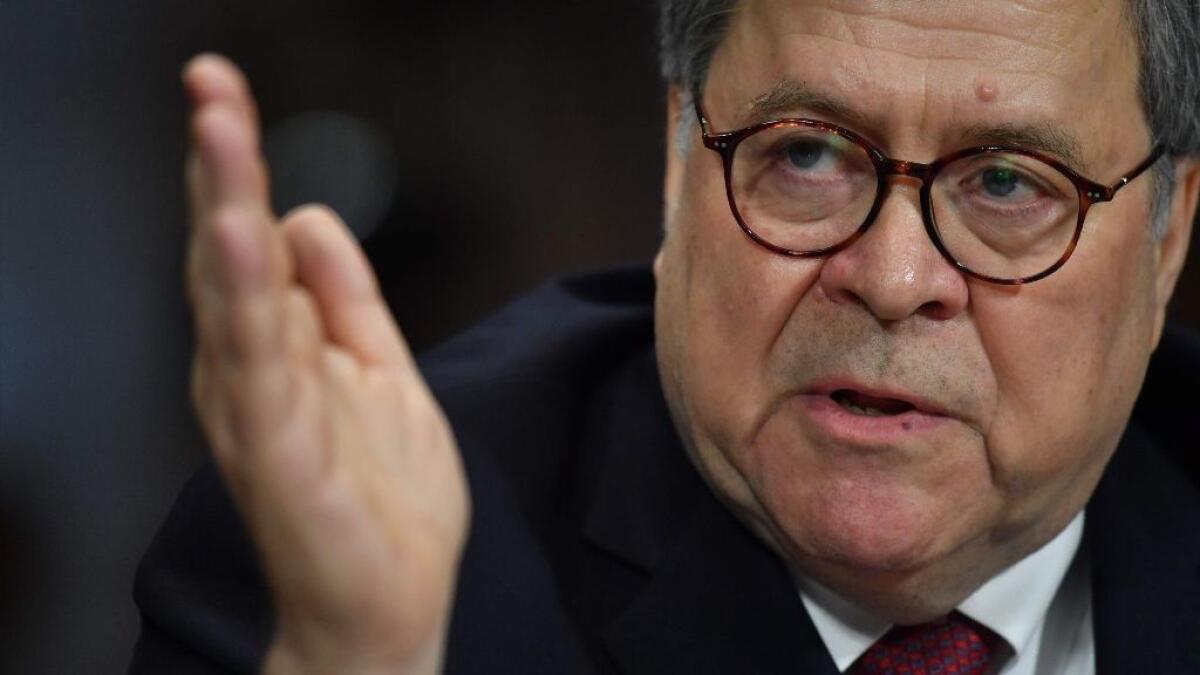Opinion: We heard from William Barr. Now it’s Mueller’s turn

- Share via
The first round of Atty. Gen. William Barr’s testimony before the Senate Judiciary Committee on Wednesday reinforced two propositions that were already obvious. One is that, in commenting on special counsel Robert S. Mueller III’s report, Barr sounds like President Trump’s defense attorney. The other is that it’s vital that Mueller testify before Congress.
Barr testified only hours after the Washington Post reported that the special counsel had complained to Barr in late March that Barr’s summary of Mueller’s major conclusions “did not fully capture the context, nature, and substance” of the investigation. (You can read Mueller’s letter here.)
While the existence of the Mueller letter was a surprise, it wasn’t news that there was dissatisfaction on the special counsel’s team with the four-page letter Barr sent to the Senate and House judiciary committees on March 24. Nor did we need the letter to realize that Barr had decided to spin Mueller’s conclusions — and other data — to the maximum advantage of the president.
For example, in testimony last month before a Senate committee, Barr said that “spying” on the Trump campaign did occur, apparently a reference to court-ordered surveillance of people associated with the Trump campaign and suspected of ties to Russia. Trump, of course, has long complained about sinister “spying” on his campaign, using the term “Spygate” to describe what he considers a politically motivated conspiracy against him.
On Wednesday, Barr refused to withdraw his use of the word “spying,” telling the committee that it’s a “good English word that in fact doesn’t have synonyms because it is the broadest word incorporating all forms of covert intelligence collection.” He also said that he didn’t believe that the word “has any pejorative connotation at all.” (Tell that to Trump.)
Barr also burnished his credentials as a Trump loyalist by putting a benign construction on events that led Mueller to conclude that Trump directed then-White House counsel Don McGahn to “have the special counsel removed.”
The attorney general suggested that Trump couldn’t have obstructed justice because he was concerned about alleged conflicts of interest on Mueller’s part — one “conflict” involved a billing dispute Mueller once had with the Trump National Golf Club in Virginia — and because even if Mueller were removed because of the “conflict,” another special counsel would have replaced him.
Barr also said that he disagreed with Mueller’s refusal to say whether Trump had obstructed justice. (After Mueller completed his investigation, Barr and Deputy Atty. Gen. Rod Rosenstein determined for themselves that the evidence adduced by Mueller wasn’t sufficient to establish that Trump committed “an obstruction-of-justice offense.”)
Barr’s testimony further muddied the question of precisely why Mueller didn’t conclude one way or another whether Trump had obstructed justice. Was it simply because an opinion by the Justice Department‘s Office of Legal Counsel holds that a sitting president couldn’t be indicted? It’s hard to be sure.
Even before Barr’s testimony on Wednesday, it was clear that Congress needed to hear from Mueller himself. The attorney general has said that he has no objection to Mueller testifying. The sooner that testimony is arranged, the better.
Enter the Fray: First takes on the news of the minute »
Follow the Opinion section on Twitter @latimesopinion and Facebook.
More to Read
A cure for the common opinion
Get thought-provoking perspectives with our weekly newsletter.
You may occasionally receive promotional content from the Los Angeles Times.










